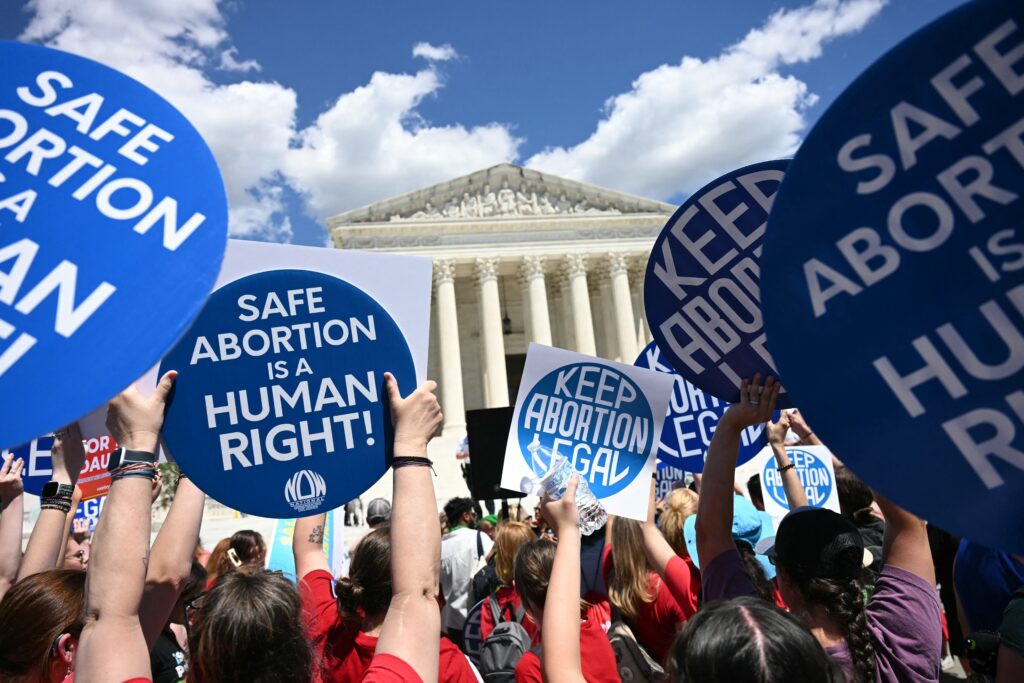Abortion Is on the Ballot Once Again

Next week’s elections will be the first real test of enthusiasm for Democrats in the Trump 2.0 era. They also will matter for abortion rights, either by preserving the status quo — sadly not a given these days — or setting the stage to expand access. Here’s how the contests in New Jersey, Pennsylvania and Virginia could affect reproductive freedom locally — plus how a California ballot measure could have nationwide implications.
Get updates straight to your inbox — for free
Over 450,000 readers rely on our daily and weekly newsletters for the latest in voting, elections and democracy.
New Jersey, which is electing a new governor, is one of nine states plus Washington D.C. with no gestational limit on abortion care. Democratic nominee Rep. Mikie Sherrill would continue the current policy and supports codifying abortion in the state constitution, while GOP nominee Jack Ciattarelli has said he would sign a 20-week ban.
People require abortions later in pregnancy for various reasons, from medical concerns to barriers in accessing care earlier, and such a law would harm both residents and people traveling to New Jersey from other states.
During an October debate, Ciattarelli claimed that he has “always supported a woman’s right to choose,” but he apparently doesn’t trust women to make their own decisions. He also said he’d “defund” Planned Parenthood and end Medicaid coverage of abortion, and has pledged to send taxpayer funds to anti-abortion crisis pregnancy centers. Ciattarelli was recently caught on camera saying he’d name an anti-abortion former member of the legislature to the state Supreme Court. Access to abortion and reproductive health care writ large could look very different in New Jersey if he were to become governor.
Meanwhile, Pennsylvania is holding retention elections for three Democratic justices on the seven-member court, where Democrats have a 5-2 majority. The court ruled last year that abortion restrictions could be considered sex-based discrimination under the state’s Equal Rights Amendment — a decision that could prove crucial in a crucial ongoing case about whether the state’s ban on using Medicaid funds to cover abortions violates its constitution. (The health insurance program covering this care could mean the difference between low-income women getting an abortion or giving birth against their will.)
If the three justices lose their elections, the court would be deadlocked 2-2 and the lawsuit against the Medicaid ban — among many other important cases — would stall. iIf they win, abortion rights advocates might choose to challenge other unnecessary restrictions they’ve been unable to repeal in the gerrymandered legislature.
Virginia is another state with a governor’s race, as well as contests for seats in the state house. Democrats are hoping to win a trifecta so they can pass a reproductive freedom ballot measure — and to block the shorter-term threat of an abortion ban.
The GOP nominee, Lt. Gov. Winsome Earle-Sears, said in an October debate that she’d sign an abortion ban at 15 weeks, or even earlier if such a bill could pass the legislature. That would be devastating. Virginia is the only Southern state without a post-Dobbs ban, and for some, traveling to Virginia is their only option. Long term, the House of Delegates needs to pass a constitutional amendment to protect abortion rights again next session in order for it to go before voters in 2026. Anti-abortion groups are campaigning in target House districts to prevent the amendment from passing again. It’s an important reminder that the down-ballot races are just as critical as the top job.
Finally, in California, residents will consider Proposition 50, the redistricting measure designed to counteract GOP efforts to steal the House of Representatives in the 2026 midterms. Control of the House is important to block further attacks on reproductive freedom. After President Donald Trump pressured Texas Republicans to redraw their congressional map to favor the GOP, California Gov. Gavin Newsom proposed a referendum on letting the legislature temporarily redraw congressional maps. (The task is usually left to an independent commission.) More Republican-led states are following Texas’ lead, and if Democrats don’t fight fire with fire, the House could have the votes to pass a national abortion ban after 20 weeks, or even earlier. In addition, friendlier districts could shield members of Congress from accountability for passing a bill “defunding” abortion providers that Trump signed on July 4.
A House with more comfortable margins for the GOP could pass another “defund,” possibly for more than just one year as in the current law. Planned Parenthood warned that kicking its affiliates out of Medicaid could lead to 200 clinics closing across the country, many in states where abortion is still legal. Planned Parenthood has called this federal funding exclusion a “backdoor abortion ban” because the procedure would still be legal on paper but much less accessible. That’s why Planned Parenthood Action Fund, local affiliate advocacy groups, and Reproductive Freedom For All are pulling out the stops for Prop. 50.
“With democracy and access to basic health care on the line, we are strong in our support of Prop 50, providers, and their patients in California and beyond,” Planned Parenthood Action Fund President and CEO Alexis McGill Johnson said in a statement.
Supporters of abortion rights have a lot to vote for on Tuesday.
Susan Rinkunas is an independent journalist covering abortion, reproductive health, and politics. She is a cofounder of Autonomy News, and a contributing writer at Jezebel. Her reporting has appeared in The Guardian, Slate, The New Republic, The Nation and more.
As a Democracy Docket contributor, Susan covers the intersection of abortion, bodily autonomy and democracy.